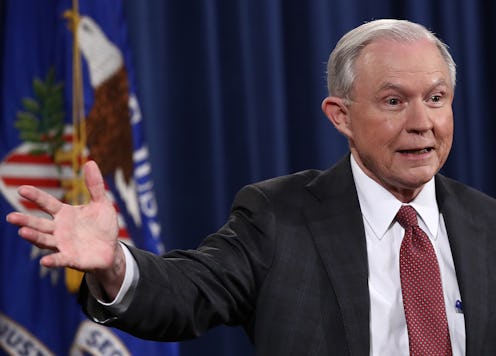News
Sessions' Russian Contact Is Worse Than Flynn's

Attorney General Jeff Sessions announced Thursday that he would recuse himself from any investigations into Russian interference in the 2016 presidential election. Politicians from both parties had called on him to do so, following the Washington Post report Wednesday that Sessions met with Russian ambassador to the United States, Sergey Kislyak, and failed to disclose that when the issue of contact with Russian officials arose during his Senate confirmation hearing. But should Sessions go a step further and resign, especially considering Michael Flynn did so?
Trump's former national security adviser was forced to resign after reporting — also from the Post — revealed he had misled Vice President Mike Pence about his conversations with Russia (and may have also violated the Logan Act, though that's actually less of a concern). However, Sessions appears to have "misled" the entire Senate, while under oath.
At Sessions' confirmation hearing, he responded to a question from Sen. Al Franken about how he'd react if he discovered any members of Trump's campaign to be in contact with Russia. Sessions said, "Sen. Franken, I’m not aware of any of those activities. I have been called a surrogate at a time or two in that campaign and I did not have communications with the Russians, and I am unable to comment on it." In a written question from Sen. Patrick J. Leahy, Sessions was also asked, “Have you been in contact with anyone connected to any part of the Russian government about the 2016 election, either before or after election day?” Sessions wrote, "No."
It's now clear that Sessions did have communication with Russian officials, as he met twice with Ambassador Sergey Kislyak. Sessions has argued that his meetings with Kislyak were conducted in his capacity as a senator, not as a member of Trump's campaign, thus his Senate testimony does not rise to the level of a lie.
The Wall Street Journal reported that when Sessions first met with Kislyak, while the Republican National Convention was happening, it was directly following a speech made at the Heritage Foundation — a speech some observers say specifically referenced Trump's trade policies. (Not to mention the two events — Sessions' speech and the RNC — were contemporaneous.) Further, Sessions used his own reelection fund to pay for that trip, notably not official government funding that would normally cover such expenses for senators.
Here's a broader cause for concern: The wildly altered views of Sessions when it comes to Russia. Prior to joining up with the Trump campaign, Sessions had been a longtime and vocal critic of Vladimir Putin. As Sarah Wildman detailed for Vox, over the course of nearly two decades in the Senate, Sessions "was considered among the most reliably hard-line of Russia hawks." He spoke out against the Russian invasion of Georgia in 2008, and lambasted the Kremlin for its annexation of Crimea in 2014. "I believe a systematic effort should be undertaken so that Russia feels pain for this," Sessions argued after Russia invaded Crimea.
Then, Sessions endorsed Trump. And lo and behold, his tune on Russia appeared to change. A lot.
In July, Sessions told CNN, "This whole problem with Russia is really disastrous for America, for Russia and for the world. Donald Trump is right. We need to figure out a way to end this cycle of hostility that's putting this country at risk, costing us billions of dollars in defense, and creating hostilities.” That's quite a turnaround.
Unlike Sessions, Flynn appeared to bring his own softer stance on Russia with him, rather than absorbing it from Trump. As The Atlantic noted, Flynn was "a paid speaker at Russia Today’s anniversary dinner and, apparently, a frequent interlocutor of the Russian ambassador to the U.S."
I worry that Sessions' altered rhetoric, willingness to meet with Kislyak, and misleading of Congress looks like a turn toward Trump's "America First" outlook. It's a worldview dominated by the elevation of power, with little if any emphasis placed on actual principles. Moreover, I worry about what exactly fueled this about-face on Russia.
With Flynn, I knew we were getting someone with a curious relationship with Russia, but Sessions is more of a surprise and, thus, disconcerting. For many critics of the Trump administration, Sessions' case raises more concerns that there is not merely a single incident or cabinet member who has questionable ties with Russia. Rather, it suggests a larger problem and represents one more piece of proof of widespread administration rot.